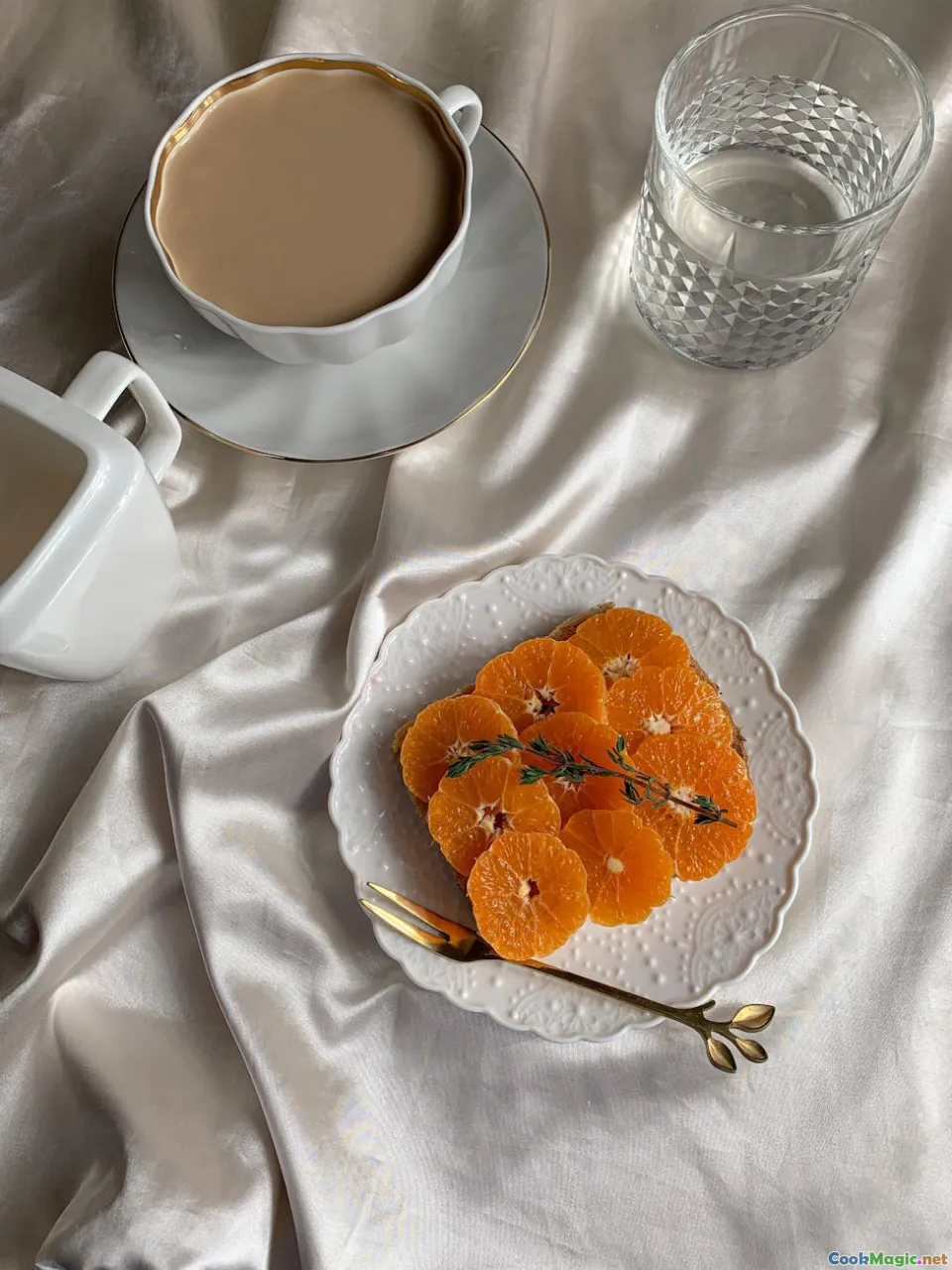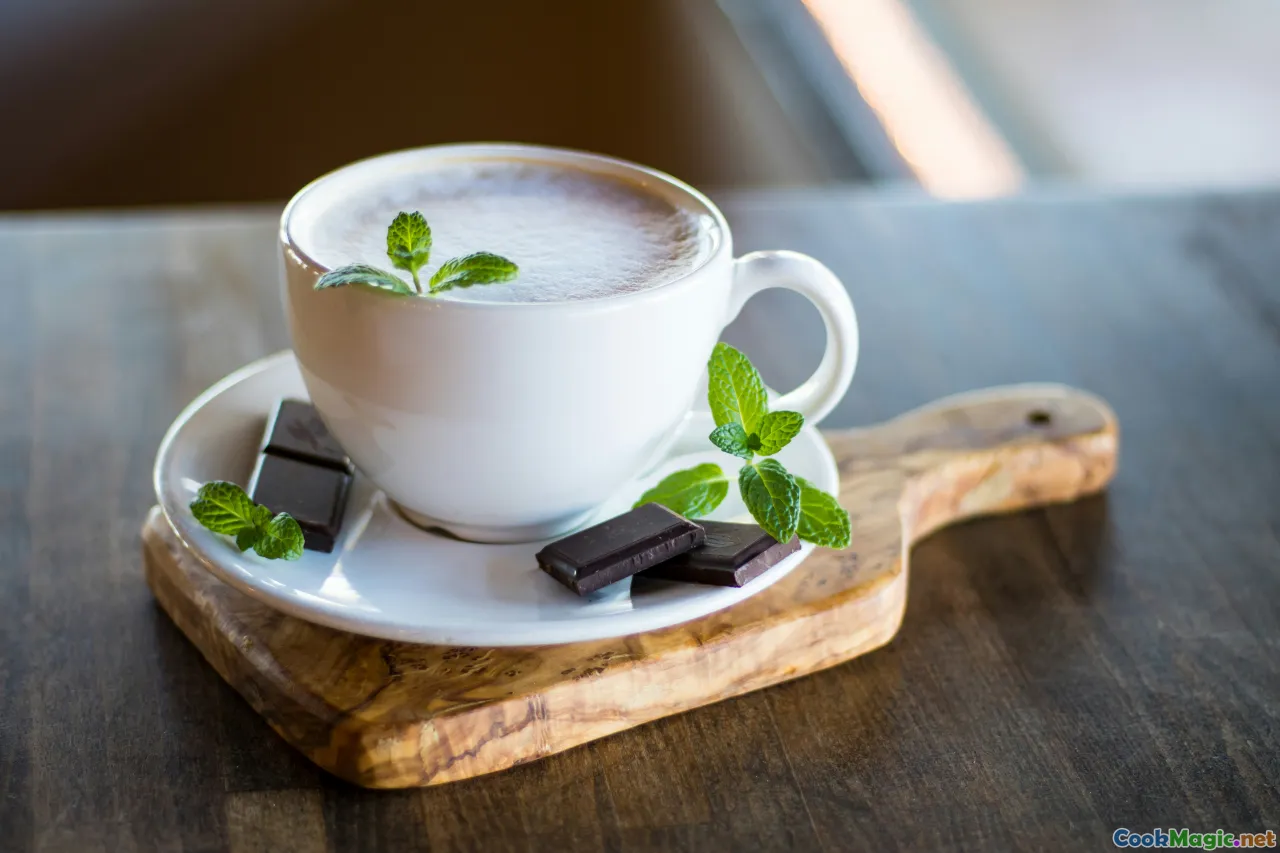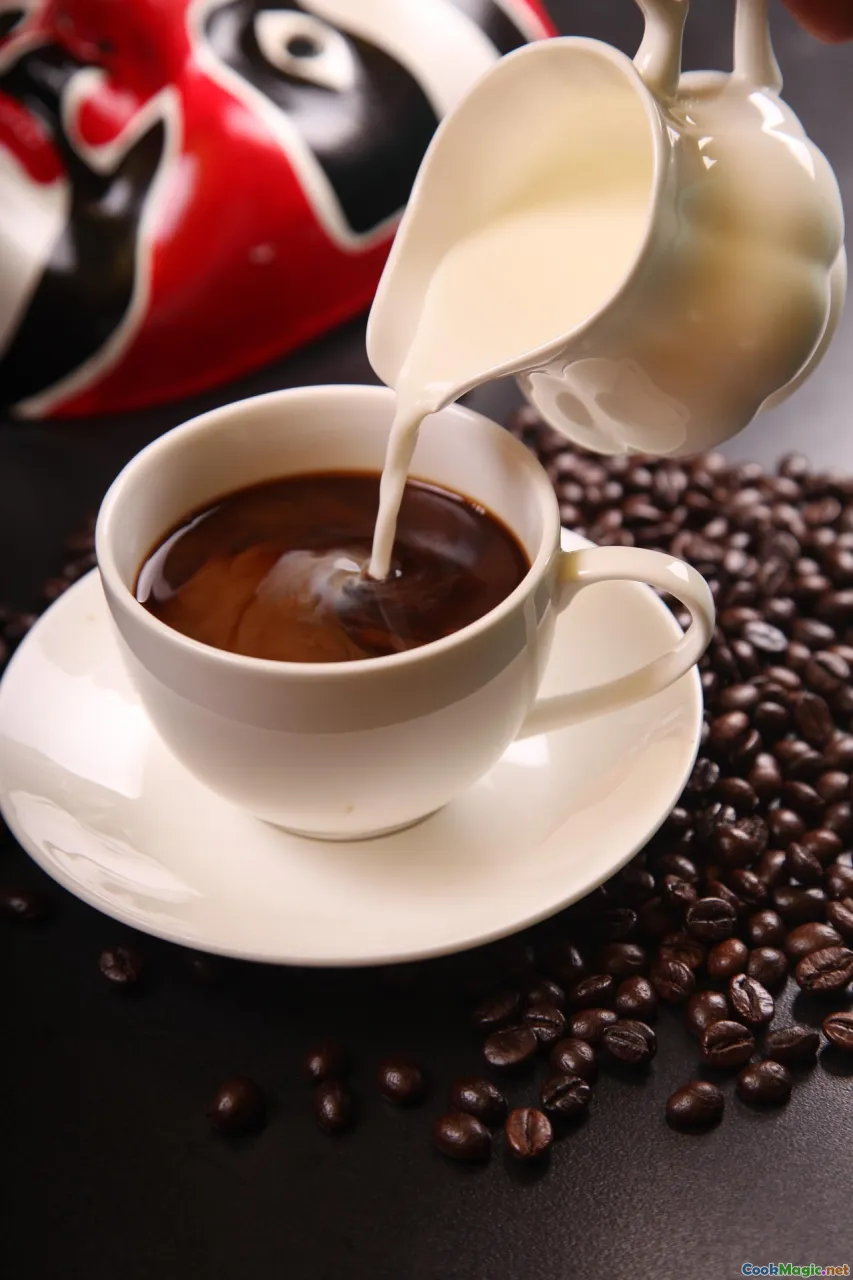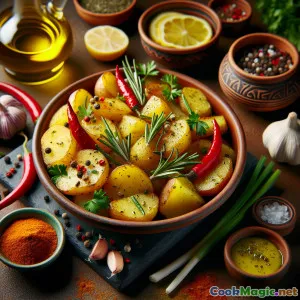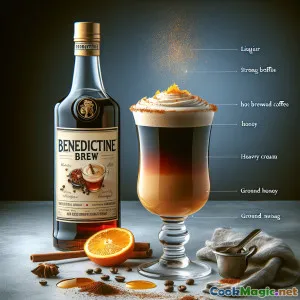
Benedictine Brew: Aromatic Herbal Coffee Cocktail
(0 Reviews)Ingredients
-
30 ml Benedictine liqueur
(Aromatic herbal French liqueur)
-
120 ml Hot brewed strong coffee
(Ideally dark roast or espresso for deep flavour)
-
30 ml Heavy cream
(Lightly whipped for topping)
-
1 tsp English honey
(Adds subtle floral sweetness; optional)
-
1 pinch Ground nutmeg
(For garnish; can substitute cinnamon)
-
1 strip Orange zest
(Adds a citrusy aroma)
(Aromatic herbal French liqueur)
(Ideally dark roast or espresso for deep flavour)
(Lightly whipped for topping)
(Adds subtle floral sweetness; optional)
(For garnish; can substitute cinnamon)
(Adds a citrusy aroma)
Nutrition
- Servings: 2
- Serving Size: 1 glass (180 ml)
- Calories: 205 kcal
- Carbohydrates: 14 g
- Protein: 2 g
- Fat: 11 g
- Fiber: 0 g
- Sugar: 11 g
- Sodium: 22 mg
- Cholesterol: 38 mg
- Calcium: 52 mg
- Iron: 0.2 mg
Instructions
-
1 - Prepare Glasses:
Warm two heatproof glass mugs by rinsing with hot water. Discard water and set aside.
-
2 - Brew Coffee:
Brew strong, hot coffee using your preferred method. Aim for a deep, robust flavour.
-
3 - Combine Liqueur and Coffee:
Pour 30 ml Benedictine liqueur into each mug. Add 60 ml hot coffee over the liqueur.
-
4 - Sweeten:
If desired, stir in half a teaspoon of English honey per serving to taste.
-
5 - Top with Cream:
Gently float 15 ml lightly whipped cream atop the drink using the back of a spoon.
-
6 - Garnish & Serve:
Garnish with a pinch of nutmeg and a curl of orange zest. Serve immediately and enjoy hot.
Warm two heatproof glass mugs by rinsing with hot water. Discard water and set aside.
Brew strong, hot coffee using your preferred method. Aim for a deep, robust flavour.
Pour 30 ml Benedictine liqueur into each mug. Add 60 ml hot coffee over the liqueur.
If desired, stir in half a teaspoon of English honey per serving to taste.
Gently float 15 ml lightly whipped cream atop the drink using the back of a spoon.
Garnish with a pinch of nutmeg and a curl of orange zest. Serve immediately and enjoy hot.
More About: Benedictine Brew: Aromatic Herbal Coffee Cocktail
Benedictine Brew: England’s Aromatic Elixir
Introduction & History
The Benedictine Brew draws upon a harmonious blend of English hospitality and continental sophistication. While Benedictine liqueur has its roots in the Benedictine Abbey of Fécamp, France, this inventive drink recipe is a love letter to the English affinity for coffee and creamy, warming drinks. Blending robust, hot coffee with the complex herbal sweetness of Benedictine liqueur and topping it all with a swirl of cream, this drink is designed as a luxurious after-dinner beverage—perfect for chilly evenings or elegant gatherings.
Herbal liqueurs have a long legacy in England, most notably whatever made its way across the Channel after the dissolution of monasteries or through trading with neighbours. Benedictine itself has been a staple in classic English club lounges since the 19th century and remains the secret ingredient in various fine cocktails. This recipe was inspired by England’s tradition of bespoke warm drinks and, more personally, by evenings spent at fireside in Yorkshire pub lounges where staff blend spirits with fresh, hot coffee and drizzle honey to soothe both the soul and palate.
Unique Aspects & Personal Notes
What moves the Benedictine Brew beyond your average coffee cocktail is the interplay of layered botanicals and the addition of delightfully English touches: a dot of honey, a dash of nutmeg atop pillowy cream, and aromatic citrus. Where most hot cocktails emphasize just warmth and alcohol, this drink delivers floral and spiced undertones with whispers of orange zest lingering above roasted coffee. Benedictine’s complexity comes from its secret recipe—27 herbs and spices—making each sip slightly different, whether drunk slowly or while chatting with friends late into the night.
The recipe is deliberately approachable but nuanced. Lightly whipping the cream isn’t just for aesthetics; it floats gracefully atop the coffee, giving each mouthful a silky smoothness. Honey provides not just sweetness, but a hint of local blossom character, connecting the drink to an English sense of place. The finishing touches—nutmeg and orange zest—are more than mere garnish; they add their own little burst of fragrance, evoking the cozy warmth of a spiced cake or pudding.
Tips, Variations, and Serving Suggestions
- Glassware: For the best enjoyment, serve in elegant clear glass mugs so the layers are visible and enticing.
- Coffee: Always use fresh, filter-brewed or French press coffee—avoid instant, as it won’t offer the same depth.
- Cream: Opt for single or double cream in the UK context, whipping it by hand to soft peaks for a lush finish.
- Sweetener: English honey brings the countryside to your glass, but dark demerara sugar or maple syrup also complement well.
- Garnish Exploration: Try a fireside variation by adding a shaving of dark chocolate or a scattering of crushed pink peppercorn on top for extra aroma.
- Chilled Version: For a summer spin, allow the coffee to cool, shake all ingredients with ice, and strain over cold coffee cubes for an iced Benedictine Brew.
Cultural Significance
Although this drink is new as a named recipe, it stands on the shoulders of classic beverages adored across England. Whether in grand hotels, cozy pubs, or friends’ homes, the act of combining herbal spirits and hot drinks is woven into the kind of relaxed luxury that epitomizes English cocktail culture. Benedictine Brew bridges old and new: a nod to both monastic meticulousness and modern comfort.
The result is a highly enjoyable drink on festive winter evenings, at holiday gatherings or with a dessert course—though, to be truthful, it may just as easily steal the show all on its own. It always feels a little special; it sparks conversations, conjures memories, and, above all, it warms. That combination of complex herbal appeal and the simple English love of a good cup creates a drink that is as welcome today as it was for clubmen 150 years ago. Enjoy the Benedictine Brew—wherever you find your armchair, hearth, or gathering of friends.

